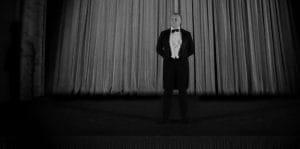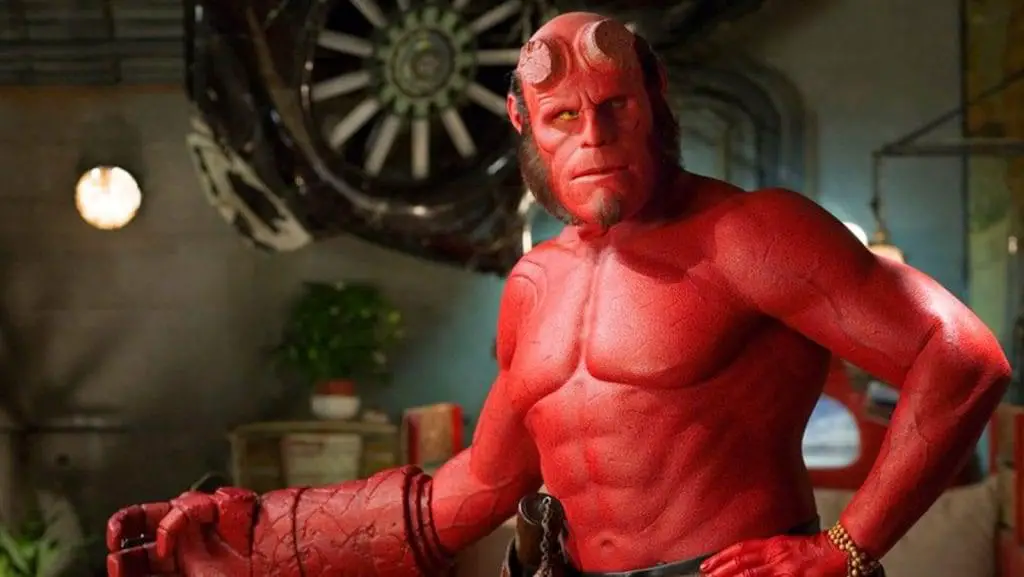
Here Comes Hell begins with George (Tom Bailey), a broad-shouldered Texan, traversing England by train to see Victor (Charlie Robb), whom he met at Oxford University a few years ago. Victor, whose dearly departed father left him a sizable inheritance, just acquired run-down mansion, Westwood Manor. Also coming to celebrate is George’s former flame and Victor’s sister, Christine (Margaret Clunie), tennis star Freddie (Timothy Renouf), and Elizabeth (Jessica Webber), Freddie’s significant other.
Once everyone has converged upon the estate, introductions and dinner are had. After that, while discussing ways to idle the time away, Victor reveals the house’s origins. Westwood belonged to Ichabod Quinn (Nicholas Le Prevost), and Victor wants everyone to hold a séance to contact the deceased occultist. To that end, he hired Madame Bellrose (Maureen Bennett), a highly skilled medium.
Even after Bellrose shows up, the others aren’t entirely convinced this isn’t a gag. However, they do acquiesce to their host’s wishes, and the séance is held. Afterward, the spiritual conduit is accidentally killed, and everyone begins having strange visions. Now, the five friends must discover how to defeat the evil spirits before they become a shambling corpse, like Bellrose.
First-time director Jack McHenry makes the most out of the film’s 1930s setting. Not only does it begin as several genre films at the time do- with a host telling the audience that what they are about to witness is not for the faint of heart–but it is immaculately filmed like one as well.
Rear projection is used for scenes in cars, the whole thing is shot in Academy ratio, which was used until 1953 for all sound productions, and the exterior shots of the mansion show that the ominous clouds above are static. Quite frankly, if it weren’t for the prominent sense of humor that runs through the whole thing, it could easily be mistaken for a film made in 1934 (as much as I love The Old Dark House and The Black Cat, they aren’t exactly known for their levity).

“…the five friends must discover how to defeat the evil spirits before they become a shambling corpse…”
The humor is a bit dark, but it never turns the movie into a farce or spoof. This is not mocking the horror films of yesteryear, instead playfully teasing certain aspects of the period. However, the quick quips usually stem directly from character and situation. Take this exchange for example, as Freddie and Elizabeth are speeding toward Westwood Manor:
Freddie – “We’re all going to die, Elizabeth. The one thing we can choose is if we do it with style.”
Elizabeth – “And crashing into a ditch is with style?”
Nothing malicious there and the entire conversation, of which this is just a snippet, is a fun, flirty way to establish the basis for their relationship.
The cast is irreplaceable and Here Comes Hell wouldn’t be nearly engaging if it weren’t for their impressive chemistry on display. The trickiest role is held by Clunie, as the self-important Christine. She left George after he proposed to her, she looks down on Elizabeth, as she is the only one not from money, and finds the whole night (before the horror begins) to be a bore. Clunie makes the character not only fun to hate but also robust and sympathetic. The audience wants to see her survive, despite themselves.
As Freddie, whose best tennis matches are behind him, Renouf is effortlessly charming. As more is revealed about his true motivations, the sway he holds over the audience gently slides away, and a slithering, heartless man is shown. Renouf makes that transition both believable and compelling. Tom Bailey and Charlie Robb are both quite affable and fun, which works well for their friendly characters.

“…amazing screenplay and the jaw-dropping mastery of tone and camera work…”
As Madame Bellrose, Maureen Bennett is a source of a lot of the grins produced. However, it is Jessica Webber as the humble Elizabeth that steals the show. She brings humanity to Here Comes Hell, which makes the supernatural activity grounded to reality, thus more accessible for the audience to buy into. After learning where Ichabod Quinn held his dark art rituals, Elizabeth takes a sword and confidently heads for the basement; even as the house is shaking, glass from the windows is shattering everywhere, and more walking dead have arrived. This confidence and strength leap off the screen, right from her first appearance, to create a final girl that the audience can get behind.
Of course, the three-dimensional characters started life on the page first. Jack McHenry and Alice Sidgwick’s screenplay is brilliant. Aside from the characters, and well-placed humor, the script takes great pains to make the horror feel authentic. It pays off in dividends as the comedy, dread, and drama meld brilliantly together, to create a pastiche of feelings in the viewer, all well earned by the sumptuous production.
An intense sequence involves the dead Bellrose trudging down a hall, in search of victims. Christine is on the opposite side, looking for a way to avoid the hellish undead being, when a pair of arms grabs Christine, covers her mouth with their hands, and yanks her backward. The camera is on a tight side view of the captive, as Bellrose slowly emerges from the background and comes within half an inch of Christine’s face, but can’t see her. It is creepy and keeps the audience on the edge of their seats.
The biggest shock in Here Comes Hell is that this is Jack McHenry’s first film. Between the amazing screenplay (this is co-writer Sidgwick’s first outing as well) and the jaw-dropping mastery of tone and camera work, McHenry’s talents will take him far in the film world. Considering how flawless his debut is, I cannot wait to see what comes next.
Here Comes Hell is made with a passion for the 1930s horror films that inspired it. Passion is not always enough though, but McHenry, along with his fantastic crew and cast has crafted something brilliant and uniquely stylized.
Here Comes Hell (2018) Directed by Jack McHenry. Written by Jack McHenry, Alice Sidgwick. Starring Margaret Clunie, Tom Bailey, Timothy Renouf, Jessica Webber, Maureen Bennett, Charlie Robb.
10 Standing Ovations (out of 10)

